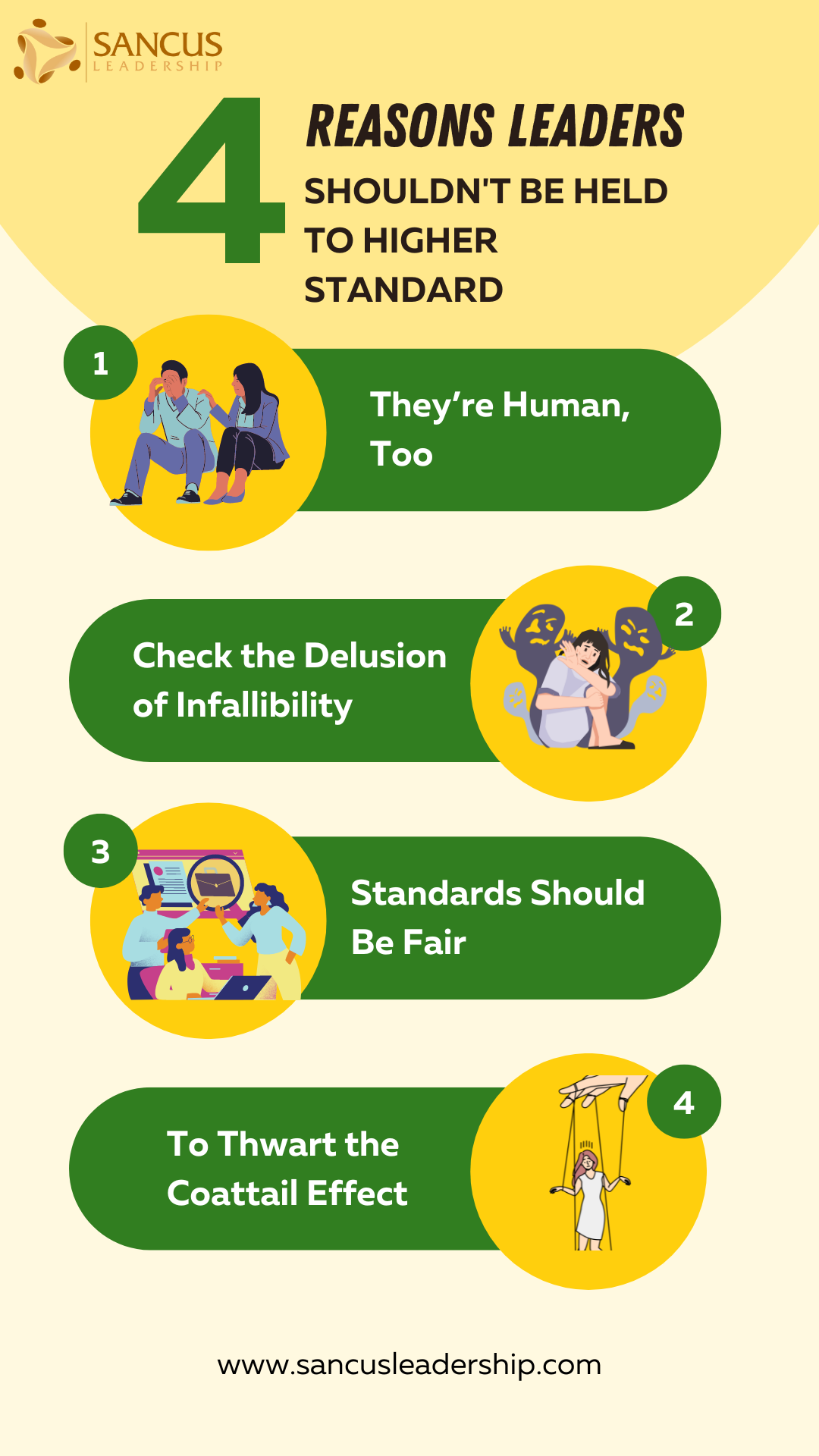Leaders are commonly judged by higher standards than how others are judged. We expect them to be practically better at everything and always to be a cut above the rest. We feel immensely disappointed when they fail or fall short of our expectations. Sometimes, when we question their leadership rather than offering them the same compassion and empathy, we expect others to extend to us.
Leaders shouldn’t be held to a higher standard because they’re also human and bound to have weaknesses and strengths. Assuming they’re infallible may have disastrous consequences for the team. This also sometimes lowers the bar for others, creating an imbalance in team performance.
In this article, we will talk about some compelling reasons why leaders shouldn’t be held to a higher standard, starting with the acknowledgment that they have their strengths and weaknesses to contend with. Then we will tap into the issue of equitability and leveling the playing field regarding team performance. We will also explore the delusion of infallibility leaders are held to a higher standard sometimes acquire and how it can be detrimental to a team.

Should Leaders Be Held to a Higher Standard?

Leaders shouldn’t be held to a higher standard because, like everyone else, they are prone to weaknesses, mistakes, and apprehensions. Expecting them to be practically faultless can encourage the delusion of infallibility. Moreover, it can lower the standards and decrease expectations for the rest of the team, making leaders carry the brunt of the responsibilities and promoting an imbalance in team dynamics.
Let’s break down these concepts further:
1. They’re Human, Too
Sometimes, we tend to put our leaders on a pedestal and forget they’re imperfect and vulnerable, too, just like the rest of us. They have their own merits and faults, harbor insecurities, and may also have misgivings about their leadership brand. Like everyone else, they should be given allowances for failure and mistakes and must not be harshly judged based on these alone.
Some leaders pressured with being held to a higher standard are compelled to lie or withhold information to avoid disappointing their team; this behavior creates toxic bosses. Others can’t own up to their shortcomings and mistakes for fear of being ostracized. Showing vulnerability in leadership is seen as a weakness, so these leaders merely put on a brave front despite needing support and understanding from others.
2. To Check the Delusion of Infallibility
Leaders are bound to make mistakes and may sometimes even fail, regardless of how good they are, how impressive their track record is, and how long their experience is in their field of expertise. Holding leaders to a higher standard pushes them to put their best foot forward at all costs. This isn’t necessarily wrong, but you’ll risk making leaders develop overconfidence that may become unrealistic and impracticable.
A leader who revels in the delusion that they are infallible will have their world come crashing down on them once they face failure.
A leader who revels in the delusion that they are infallible will have their world come crashing down on them once they face failure.
This calls to mind a story about John, a guy who used to be the head of a small consultancy firm. The nature of his work allowed him to interact with big shots from various industries who turned to him for help in handling sensitive business concerns.
Unfortunately, John’s proficiency at his job went to his head and made him feel utterly invincible.
A pawnshop owner contacted him one day, asking for guidance in formulating actionable solutions to business issues overwhelming him. John eagerly took on the challenge, never daunted by the fact that he had no experience, know-how, or insights into this kind of business.
He disregarded input from his team, secure in the belief that, as their leader, he should be the sole decision-maker. He also wanted to live up to his reputation as an all-around proficient, dependable guy known for coming up with innovative solutions and ideas.
The client became dissatisfied and frustrated with my friend, and he inevitably lost that business opportunity. Instead of asking for help and admitting he needed assistance, he plunged headlong into the challenge. Unfortunately, the solutions he came up with were irrelevant and potentially damaging to the pawnshop. Moreover, this incident spread like wildfire to his client base, and some lost confidence in him.
Unfortunately, John harbored a delusion of infallibility, thanks to the extremely high standards set on him. On the other hand, it’s also regrettable that the people around him turned their backs on him the instant he displayed vulnerability.
3. Standards Should Be Fair
Leaders shouldn’t be held to a higher standard than the rest of the team because that seems discriminatory. Along with their leader, each team member should be kept to a high standard based on their roles.
In business, double standards are frequently associated with unfair treatment between individuals in the same “category.” For instance, two employees responsible for handling a particular piece of equipment in the workplace end up damaging it beyond repair due to negligence. There is a double standard if, without any valid reason, only one will be disciplined and penalized while the other gets away scot-free.
Regarding the leader-employee setup, it would be unfair for the leader to be held to a higher standard if their team was not expected to adhere to the same level of ethics. It boils down to being held to a high standard based on each person’s roles and expertise in the team.
For instance, leaders should be held to a higher standard when it comes to matters about managing the team. They must be effective in leading the team toward common goals. They must be able to extend support to their team members, especially during critical times. They must also motivate the team and serve as a great role model for them to emulate. Their core values should be integrity, excellence, passion, and commitment.
For instance, leaders should be held to a higher standard when it comes to matters about managing the team.
In the same way, the bar should be set high for employees as they go about their roles and responsibilities in the team. Efficiency, professionalism, collaboration, and the drive to excel must always be apparent.
They must also display integrity, passion, and teamwork, which are essential for teams to survive in the challenging business world.
At Sancus Leadership, we encourage leaders and team members to cultivate values critical in allowing the team to function efficiently, synergistically, and productively. We highlight the benefits of these principles because these are what can assist the team in continuously moving toward common objectives.
4. To Thwart the Coattail Effect
The coattail effect refers to someone or a group of people riding on the success of another, mainly based on association alone. It’s more commonly used in politics, particularly during elections, when one popular, well-loved candidate attracts votes for the rest of their party members due to their alliance. It’s like hitching a free ride where only one person does all the hard work.
When leaders are held to a higher standard, they’re pushed to step beyond their comfort zone and continuously strive for improvement and excellence. This isn’t a bad thing, but if the same level of excellence is not expected or demanded from the rest of the team, some might begin to slack off and perform below par, knowing that their leader has their back anyway.
Employee freeloaders can damage a business, particularly in small teams where each person’s contributions significantly affect efficiency and productivity. Typically, freeloaders put in just enough work to not get fired, so the team is certainly short-changed concerning the investment made in them.
Employee freeloaders can damage a business, particularly in small teams where each person’s contributions significantly affect efficiency and productivity.
| Should Leaders Be Held to a Higher Standard? | Description |
| Leaders are human too | Leaders should be recognized as imperfect and vulnerable, just like everyone else. They should be allowed to make mistakes and not be judged solely based on their failures. |
| Delusion of infallibility | Holding leaders to a higher standard can lead to unrealistic expectations and overconfidence. Leaders need to acknowledge their fallibility and learn from their failures. |
| Standards should be fair | Leaders and team members should be held to high standards based on their respective roles. Double standards in discipline and accountability are unfair and create resentment. |
| Thwarting the coattail effect | Holding leaders to a higher standard can motivate them to strive for improvement and excellence. However, if the rest of the team slacks off, it can create an imbalance and affect productivity. |
Here’s a video of Simon Sinek talking about how to lead with authenticity and empathy and how it’s important for leaders to show that they’re human too.



